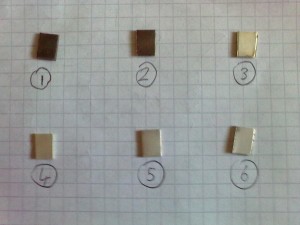UPDATED 25/04/10
This post is a description of tests using simple household acids to pickle oxidised silver. 1mm sterling silver sheet was cut into pieces, weighing approximately 0.65g, and then oxidised with a small oxy-hydrogen torch. One piece was kept as a control, and the others were exposed to various substances. A discussion of pickles and de-oxidising during the early middle ages can be found here.
Each piece of silver was placed in a plastic cup with about 25ml of liquid, and left for three days. The intention was to find out whether they could be pickled at all – later tests will look at speeding up the process. In the case of orange juice and lime juice, the silver appeared not to be pickled, but cleaning it revealed it was just a residue that washed off with water.
- Control, no liquid used
- Whiskey (43% by vol), pH 5
- Malt vinegar, pH 3.5
- White wine vinegar, pH 3
- Lime Juice (fresh), pH 2.5
- Orange Juice (carton), pH 4
The whiskey didn’t effect the silver at any time. All the other acidic liquids successfully pickled the silver, although there were some slight residues left. A further test was done, in the same conditions as above. The results are:
- Borax solution, pH 10
- Boric acid solution, pH 4
- Saltwater, pH 6
Borax and boric acid had no effect. Saltwater did remove most of the oxide, but took a week to do so. The next test was done under the same conditions, with borax flux melted onto silver, leaving a glassy residue, but done without oxidising the silver:
- Borax solution, pH 10
- Boric acid solution, pH 4
- Malt Vinegar, pH 3.5
- Whiskey, pH 5
- Lime Juice pH 2.5
- Caustic Soda, pH 12
- Brine, pH 6
The borax solution had no effect. Boric acid, vinegar and lime juice all worked within 24hrs. Whiskey, caustic soda and saltwater worked after 72hrs.
The next test will be hot-quenching the silver, which drastically improves the speed of modern pickling acids. After that it might be worth exploring precisely how long it takes each substance or how well they work if they are distilled. I’ve also seen a passage from an old book which suggests a mixture of vinegar and salt, so I may explore combinations to see if anything is improved.

{ 5 comments }
Have you tried alum as a pickle? It was a fairly common product in the time period you are looking at, still available today and reasonably priced.
It looks like the active compound in alum is potassium sulphate or aluminium sulphate (well, in some “alums”). Although it’s an acid, it doesn’t contain hydrogen, which I think is required for pickling. But I’ll put alum on my list of substances for the workshop, and see if it has any uses.
EDIT: Mmmm… Actually, it seems like a much broader term, so I’ll have to look into what was used traditionally for dying clothes.
I have read of a saltwater brine being used as pickle as well. And, somewhere (in the Ganoksin archives I believe) I read where a chewed substance was used in Pre-Columbian goldsmithing. I know, I know, I don’t have specifics, but I bet if you checked out the Ganoksin archives, you’d find better answers. Also, this would be a great question for our forum. :o) I bet some of these old smiths might be able to recall some of this stuff from memory, Ha ha ha.
take and build a nice fire with hard wood let it burn out, take the ashes and place them on a funnel with some cloth slowly add water use heavey gloves when you come in to contact with liquid that drips out do not make to much with each match unless you plan to keep it hot all the time but that is not needed. do not get this in your eyes do not drink. it will take your skin off. i learned the old ways i make all the old tools. my uncle worked with silver not gold but its all about the same.
there is your acid also know as lye
jen
Jen, are you describing potash production? I’ll try potash, as well as caustic soda and washing soda. I think they’re all alkaline, though.
Michael, I’ve tried saltwater – no effect after 24hrs, but I’ll keep checking. Couldn’t find anything about the pre-columbian chewed stuff, sadly. Anyone know what that is?
Comments on this entry are closed.
{ 1 trackback }